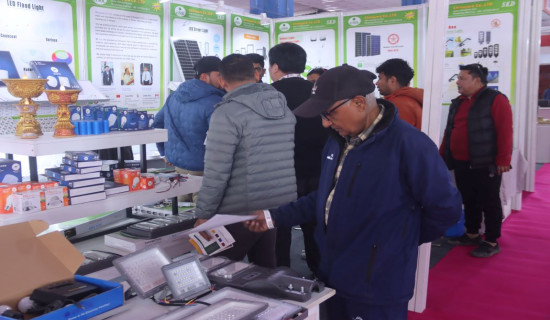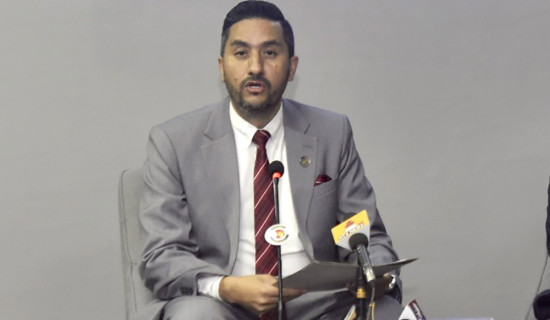- Sunday, 21 December 2025
58thAnniversary Special Supplement
TRN As A Robust Public Media
When The Rising Nepal (TRN) was born on December 16, 1965, the national and international scenario was quite different from today. TRN saw the light of day when the Cold War was at its peak. Amidst the push and pull of geopolitical forces, the Nepali state felt an urgency to articulate its own voice to project an independent image in the international arena. The nation’s first broadsheet daily came into existence to meet this historic necessity.
Several regimes came and went since the establishment of this daily, but its original mission has remained the same: to defend national interests and disseminate national points of view to a wider audience. Today we are in a digital era where social media is playing a vital role in informing people and shaping their thoughts. The newspapers served as the first traditional media, followed by radio and television. With the upsurge of online news portals, the landscape of media has undergone a drastic shift. So is the interest and priority of readers and audiences. Navigating through this turbulence, TRN has to be a sustainable entity, equipping itself with cross-cutting information technology while acting as a robust public media.
Professional ethics
It is not easy for any newspaper to sail smoothly at a time when a smartphone has become an all-powerful medium with the attributes of print, radio, and television. But despite their soaring popularity, the digital papers are facing a crisis of credibility. In a race to become the first, many of them resort to half-baked and false information. These downsides of online news portals have given an edge to the newspapers, though their circulations have massively gone down in recent years. As a pioneer English newspaper, TRN has little risk of falling into such pitfalls. People have high trust in TRN for disseminating unvarnished news and analyses of current issues to their readers. Readers’ unflinching faith in TRN is a big asset that must be honoured, for it is a source of inspiration for professional ethics and guidance.
TRN has the ability to inform and educate the people in a non-partisan manner because it does not come under the commercial and ideological influences of any group. Its sole objective is to realise the people’s constitutional rights to know about the affairs of the state and the activities of those holding public offices. The cardinal goal of media outlets is to provide credible, accurate, and unbiased information and critical opinions on burning issues to the public. The newspapers are not supposed to pass judgement on matters of public interest and events. They can offer commentary and insights via editorials, not through news.
If the news is garnished with publishers’ bias and conviction, it is unlikely to provide impartial information to the readers.
TRN’s other responsibility is to build and bolster national identity and image. Like its sister daily, Gorkhapatra, TRN is bound to project national culture, literature, values, views, and worldviews to a wider audience of the global public, thereby articulating national character and enhancing the dignity of the state. This monumental task is not necessarily borne by private media outlets, for they are driven by profit-making motives. Nepal is a multilingual, multi-ethnic, multi-religious, and multicultural country. So creating unity in diversity should be the primary duty of the media. But those media outlets operating under commercial and petty political and geopolitical interests can hardly discharge such a lofty duty.
There has also been the practice of publishing sponsored news and paid articles to establish false narratives and influence the state’s policy. Such a tendency is harmful to national sovereignty and integrity. In South Asia, Nepal has recently drawn renewed geopolitical attention from regional and superpowers. Some countries are said to have invested in media houses to get their agendas accepted among the public and policymakers. Such media agencies join a chorus in support of certain geopolitical agendas at critical moments so that they are approved by the national legislature. Media is also considered a cultural industry that must not be induced by foreign money or strategy. TRN is free from these anomalies. It is not influenced by vested commercial and geopolitical interests.
National outlook
TRN's first editorial has lucidly outlined its vision and objectives. It commits to rising above political ideology and sectional positions. It states: "As we are interested in resurgence and not in ideologies, we watch with equal interest and sympathy the progress made by countries with different political systems." The English Daily shall attempt to give expression to those views that appear to us national rather than sectional' and 'the national point of view will be expressed not through the suppression of sectional elements but through their harmonisation.' This acknowledgement amply suggests that TRN has been striving to build a harmonious society with an inclusive national character. The UN Charter has been its guideline when it comes to covering foreign and geopolitical subjects.
Nepal has undergone seismic political, social, and cultural changes since the adoption of a new constitution in 2015. This calls for embracing strategic vision and ideas to cope with the emerging challenges facing the media industry. Primarily, TRN is obliged to give priority to the state’s policy and the government’s decisions. When it comes to reporting and publishing economic, social, cultural, and international news and views, TRN enjoys autonomy. Nonetheless, it is also in desperate need of modernising its newsroom and motivating its staff so that the paper becomes more competitive, more credible, and more viable in the years to come.
(The author is Deputy Executive Editor of this daily.)











-(1)-original-thumb.jpg)





